See the Light through the Trees
God gave us the Bible in its entirety, not just our favorite verses and characters. Yet, the Bible’s ancient culture and disturbing stories are like a dark forest that obscures the light God wants us to see. This light is God’s sacrificial love at the core of the Father (creator) relationship He yearns to have with each of us, His spiritual children.
My Willful Child is a Bible study covering Genesis to Revelation. It uses a novel cast in our modern culture that chronicles the disappointment and grief of Charlie and Martha Robertson, the parents of Kent, their willful child. Kent’s unbridled ambition, greed, and arrogance lead to detachment and tragedy. However, much stronger than anything Kent could say or do is Charlie’s and Martha’s parental love. This love draws Kent from his darkness to redemption. To make this redemption permanent, the ultimate parental sacrifice is made.
Scripture excerpts parallel each chapter’s circumstances. To solidify the scriptural connection, there’s an accompanying story analysis methodology and thought-provoking questions for individual or group study.
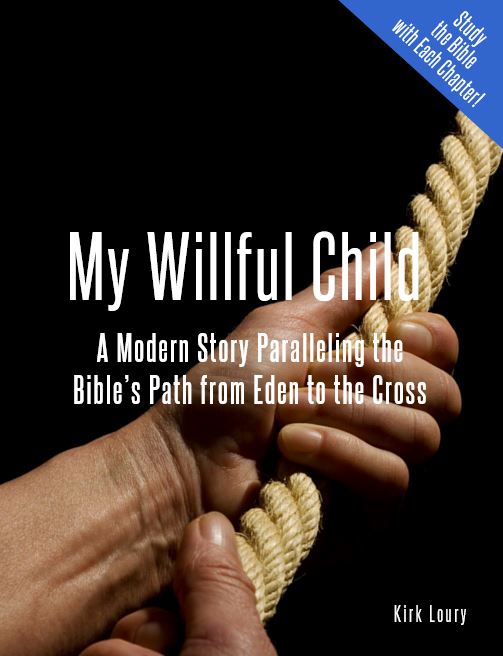
“Open my eyes, that I may behold wonderful things from Your law.”
Psalm 119:18
How Do You Feel about the Bible?

“I don’t see how the Bible fits together.”

“God changed his plans a lot for being all-knowing.”

“The idea of God as my father makes no sense.”

“I stick with just a few verses, not all of the Bible.”

“I read more about God’s anger than his love.”

“Our world is so different from Biblical times.”
Take a Look for Yourself
My Willful Child has 394 total pages (print version) and is structured as a workbook. It’s a full-size page (8.5″ x 11″) and intended for you to highlight, take notes, and write down Insights.
You will see in the Table of Contents download below that each of the 87 chapters is a specific, self-contained episode in the lives of Charlie and Martha Robertson and their son, Kent. This chapter design adapts to your time allotment, maybe one chapter for 15 to 20 minutes a day or a batch of chapters in one sitting such as a weekly group study.
Most important for the Bible study objective, over 250 full-context NIV excerpts align with each episode and unfold the parent-child theme. (The Scripture index download below shows how the Bible’s books, from the Hebrew Scriptures to the New Testament, are broadly covered.) These excerpts eliminate the time searching for chapters and verses so your reading moves efficiently.
Each dialogue-based episode draws you into the characters’ emotional integration with the circumstances at hand. The C.L.E.A.R. story analysis method (see the next section on this page) provides a framework for evaluating what’s happening in each chapter’s parallel novel and Scripture sections. Finally, the questions following the excerpts (over 375 guiding questions) identify the key considerations whether you’re working alone or as a group leader.
The six chapters provided for your preview here illustrate the workbook’s structure.
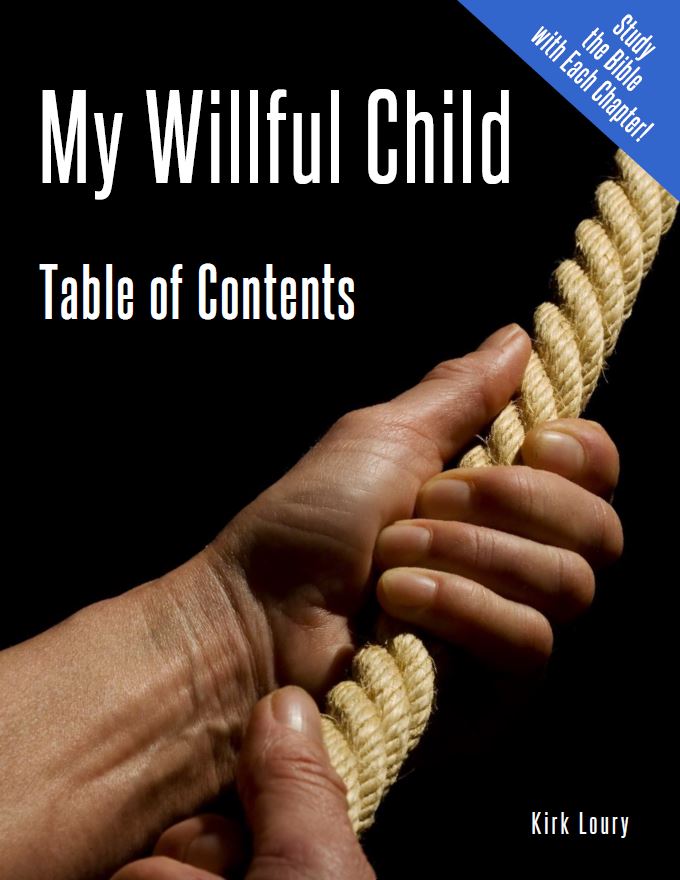
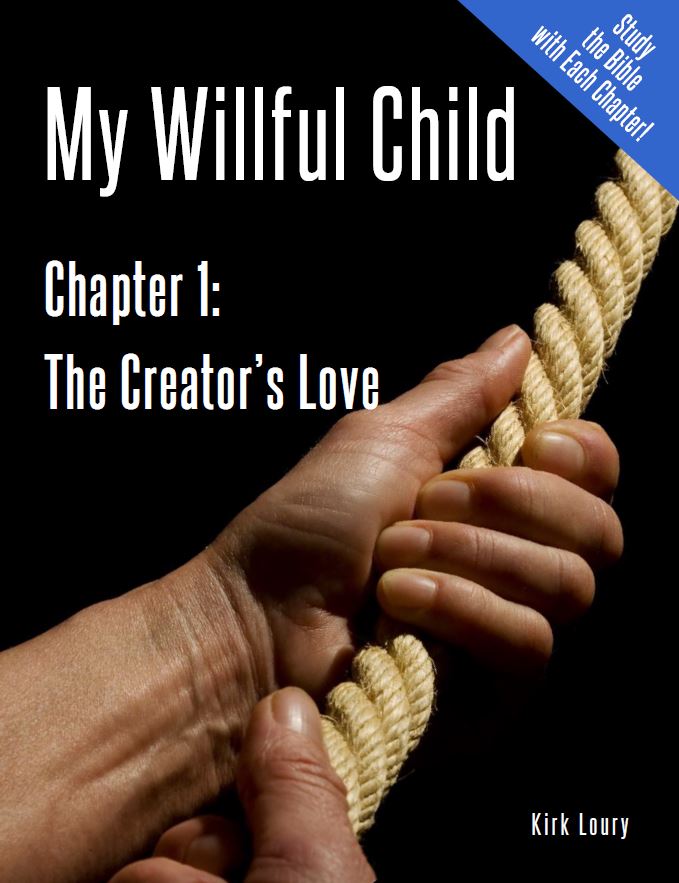
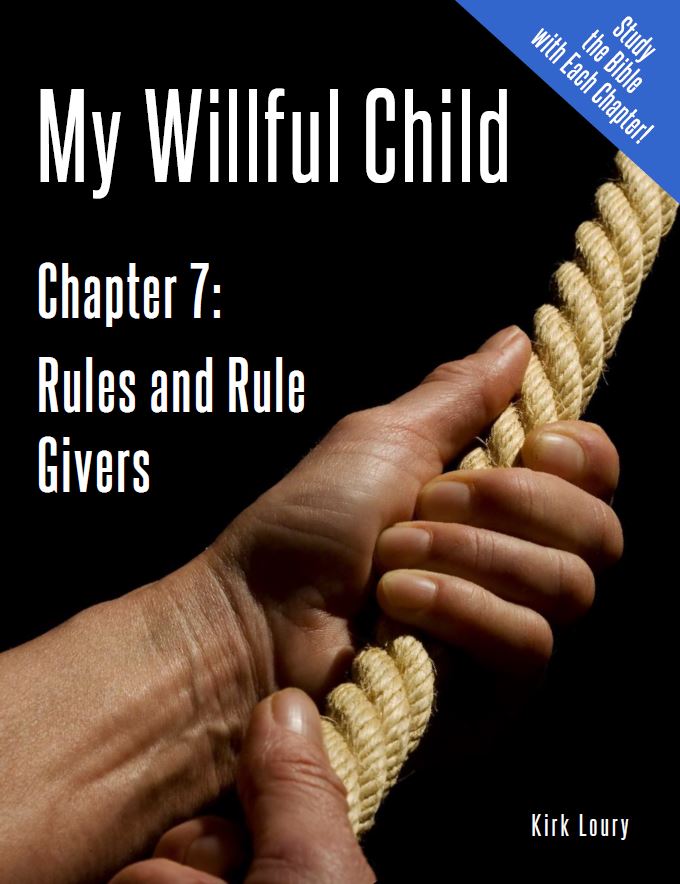
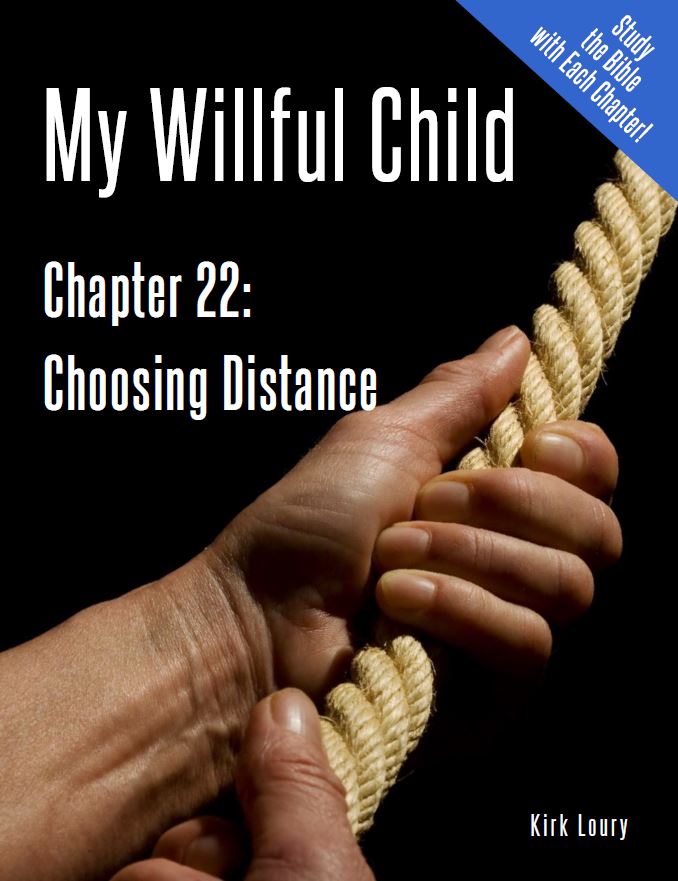
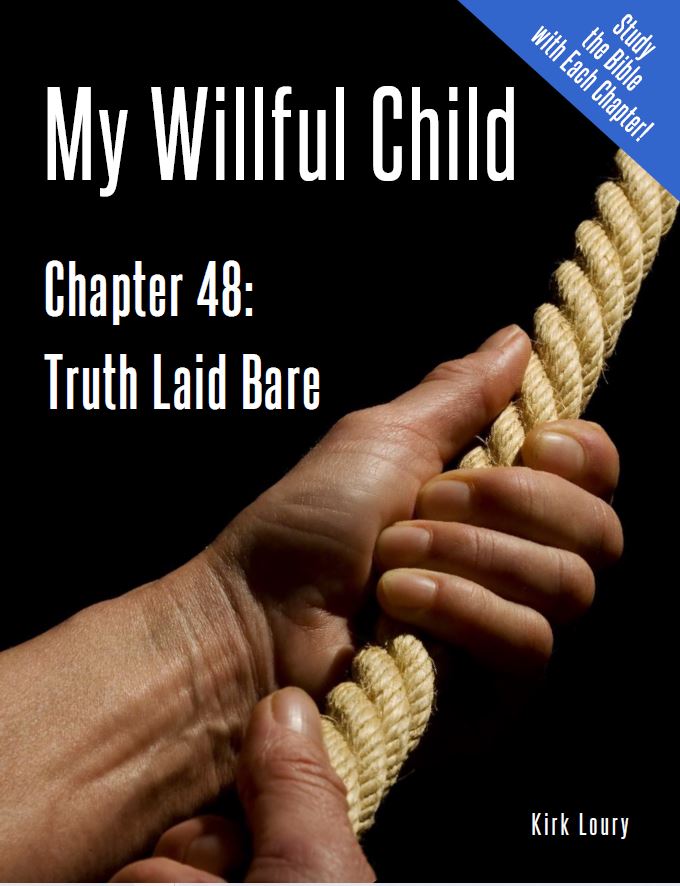
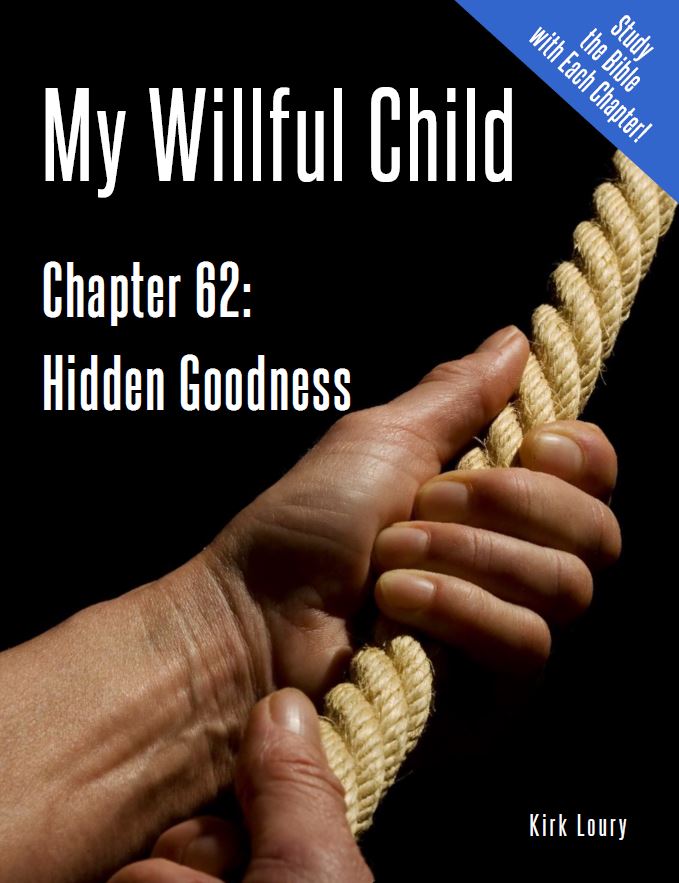
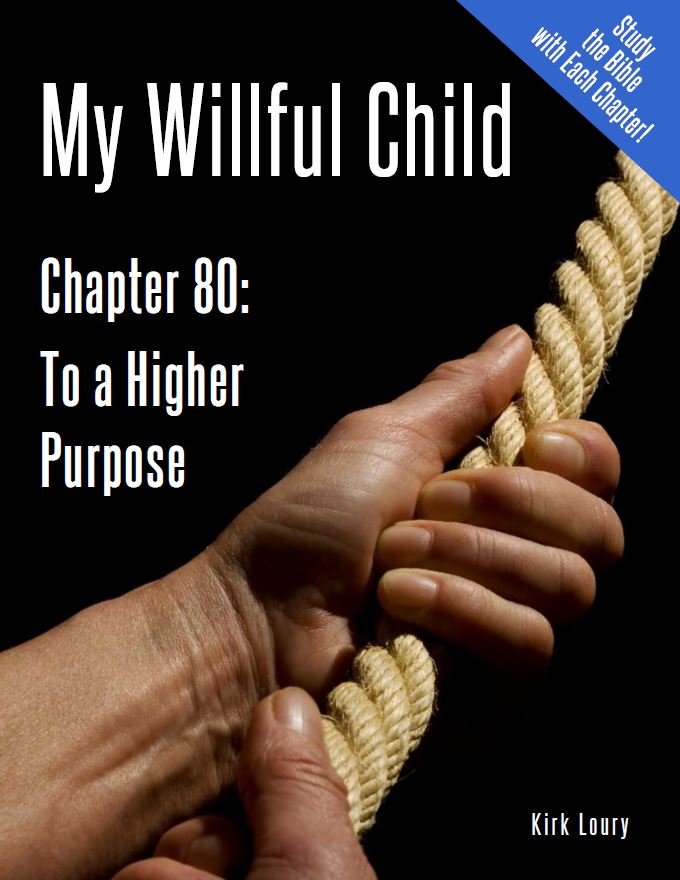
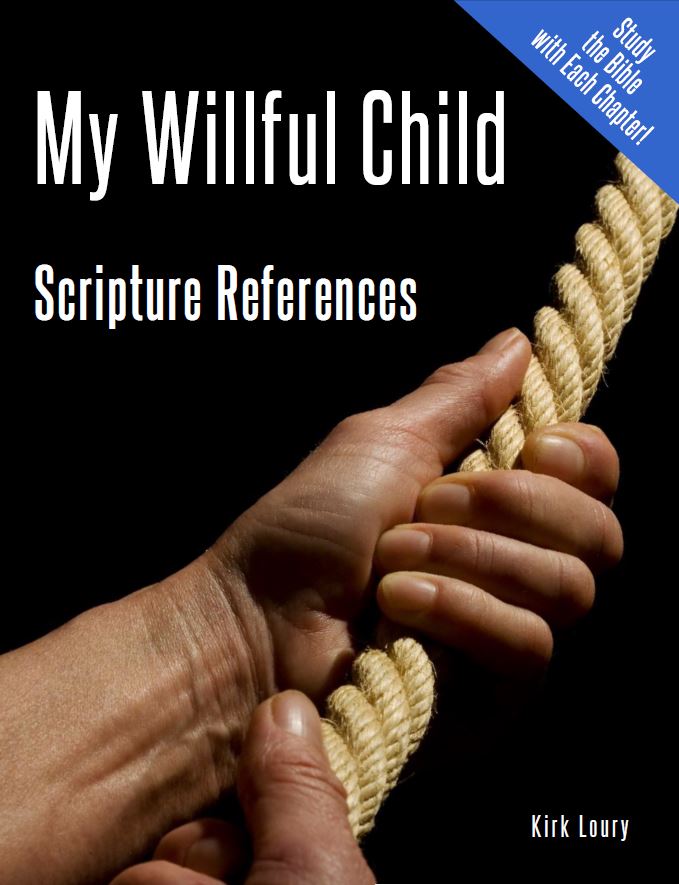
The C.L.E.A.R. Analysis Method
The Bible is a collection of historical stories across 1,500 years describing the relationship between God, our spiritual father, and His children (i.e., the singular “me” and the collective “us”).
Stories have a purpose and point of view. For both My Willful Child and the Bible, the point of view is the parent-child relationship. It’s a relationship we’re all able to grasp as most of us are or will become parents, and we’ve all been children (and parented).
A novel allows us to transport ourselves into the characters’ roles, choices, decisions, and consequences in ways we can understand. In being transported, we relate and then learn. The table below presents the C.L.E.A.R. method for analyzing stories and capturing the intended insights.





Applying the C.L.E.A.R. analysis to each of the novel’s episodes frames the selected Scripture passages within the chapter’s context. From here, the novel portion and Scripture portion unfold together.
I Want to Place an Order Please
My Willful Child is self-published through Amazon Kindle Direct Publishing (KDP). KDP is a print-to-order system for single copies or bulk orders. This means that your copy of My Willful Child will be printed for you and shipped through Amazon (along with the benefits Amazon provides in shipping rates, tracking, and refunds). A low-cost eBook option is also available for downloading through Amazon.
While self-publishing is quite common and has taken much of the control from publishing houses, you may feel there’s some risk given that My Willful Child hasn’t been scrutinized through a known publisher’s evaluation and editing process. For this reason, before buying, you are encouraged to review the downloads above and read the Q&A below; doing so will give you comfort that the expectations set on this page will be delivered when you study the Bible through My Willful Child.
About the Author, Kirk Loury

Kirk has studied the Bible for much of his adult life and has led group and classroom Bible studies for over twenty years.
He has developed his own studies using a methodology that takes a theme, a Biblical book, a chapter, or a verse and analyzes it with Scripture elsewhere in the Bible; this approach reveals the Bible’s internal consistency. Each segment is guided by study questions that link Scripture to daily living.
Kirk has experienced a wide variety of Christian faith traditions, and he values the diversity in how God’s children express their worship, praise, and love. He firmly holds to ecumenism and to the principles Jesus commanded in loving God, loving others, leaving judgment and condemnation to God, and serving others.
Professionally, Kirk has spent his career in software development, investing, and wealth management. He graduated from the University of Colorado, Boulder with a bachelor’s degree in marketing and a master’s degree from the Harvard Business School.
Kirk grew up in Colorado and settled in New Jersey after his MBA. His immediate family includes his wife, Brenda, and their three adult children: Nick, Thomas, and Marisa. Of these three, each is a caring, loving, resourceful, and faithful gift, making fatherhood for Kirk nothing but the highest privilege and joy.
Q&A with Kirk
Your Title Goes Here
Your content goes here. Edit or remove this text inline or in the module Content settings. You can also style every aspect of this content in the module Design settings and even apply custom CSS to this text in the module Advanced settings.
What do you believe about the Bible?
I believe the Bible is the word of God. This means He gave us all of Scripture, even the uncomfortable and ugly parts. It’s easy to skip over the terrible stories, but God wants us to ask the question, “What should I learn from this?”
We have to avoid getting distracted by the often significant cultural differences to see that power corrupts, love of money destroys, there’s a thin line between righteousness and being a Pharisee, and sin becomes easier the more we choose that path. In analyzing the Bible’s characters and their circumstances, we see that human (sinful) nature has not changed in thousands of years.
Scripture is certain about what God does want me (and His church) to do:
- Honor, respect, and love Him
- Love our neighbors
- Our neighbor is one unlike us
- Leave judging and condemnation to God
- Serve others in our midst
- In service, use our spiritual gifts
All believers are of equal status, and Jesus is clear that the humble, in their service, receive the greatest reward.
Is there any other aspiration or calling in the presence of free grace? For me, Paul’s answer leaves no doubt: “But he said to me, ‘My grace is sufficient for you, for my power is made perfect in weakness.’ Therefore I will boast all the more gladly about my weaknesses, so that Christ’s power may rest on me.” (2 Corinthians 12:9)
How does choice dictate our relationship with God?
My main purpose in writing My Willful Child was to connect the whole of scripture, from the evolving covenants with Noah, Abraham, Moses, and David to the new Covenant established in Jesus. The novel paralleling Scripture seeks to avoid these dodges, “People sure acted horribly, back then.” and “With what we know and in our culture’s sophistication, we would make better choices.”
It’s easy to absolve ourselves of our collective disobedience and disrespect of God by confining it only to the characters and culture in the Bible. My Willful Child‘s novel portion illustrates that what occurred thousands of years ago is fully plausible today.
My Willful Child‘s value is understanding God’s predicament in the face of His children’s disobedient (sinful) choices.
We are told in 1st John chapter 4 that God is love, but the Hebrew Scriptures reveal little of His love and a lot of God’s ongoing disappointment, grief, anger, and disgust with the choices His children made.
God’s disgust with these choices reached a point that He was going to destroy everything on earth. We must contend with God saying, “I regret that I have made them.” (Genesis 6:7)
This all-knowing, all-powerful God was admitting failure! How could this happen?
God created systems and laws that govern how all HIs creation operates from distant stars to atoms to all the mechanisms that define our earth. He established instincts in animals that guide behavior, including how to procreate, raise, and protect their offspring. All these systems, laws, mechanisms, and instincts operate independently and have done so the same way from the beginning.
God sought something different when He created humans. He wanted a relationship with HIs creation. A relationship requires each party to choose the other.
Because of this requirement, God grants us the power to make choices. To make a choice demands the ability to think of alternatives. Thinking of alternatives is a creative expression. When we tell God of our love, respect, and honor for Him, this is not an instinct. The thoughts, purposes, and, especially, actions are choices made among alternatives. In other words, we may think a lot about love, but until we choose to act on these thoughts in our words and deeds, there is no relationship. A relationship plays out like this: giving love to someone is a choice; receiving that love is a choice; giving and receiving in reply is a choice. Only then does a love-based relationship exist, and choice is required for it to continue.
A choice only has meaning if there are different consequences among the options. For example, if I make a right or left turn on a path but end up at the same place (i.e., a point on a circle), there is no real choice. An informed choice is one where we consider alternatives and understand the consequences of each, but we determine that one has a more appealing outcome compared to the others.
In the Garden of Eden, God set a choice and fully disclosed the consequences. If Adam and Eve ate from the tree of knowledge of good and evil, they would die; if they did not eat, they would live. The serpent (Satan) told a lie within a truth, “‘You will not certainly die,’ [the lie] the serpent said to the woman. ‘For God knows that when you eat from it your eyes will be opened, and you will be like God, knowing good and evil. [the truth]’” (Genesis 3:4-5)
Eve listened to both God and Satan. Listening was not wrong; Eve understood what each was telling her, and she compared the alternatives. Had Eve left it at that, Adam’s and her stay in paradise would have continued. But she chose to act upon Satan’s words and not God’s. Adam also chose the opposite of what God had commanded; both were equally guilty.
Adam’s and Eve’s choice was not to have something new and tasty to eat, but they rejected God’s authority for another. They chose to be governed by a lie. Now knowing good and evil, Adam and Eve could compare the options, and, in doing so, sin became the norm for all succeeding generations.
No one knows how many people were on earth at Noah’s time, but let’s say it was 1,000,001. A million people, instead of honoring God with respect for the Creator He was and trusting that the laws He set were wise and essential, turned away from Him to their own way. And what way was that?
Genesis 6:5 “The Lord saw how great the wickedness of the human race had become on the earth, and that every inclination of the thoughts of the human heart was only evil all the time.”
But there was one, Noah, that proved to God that men and women could, in the presence of the power to choose, make right, God-honoring choices. We call this righteousness. Noah was also faithful. This means his good choices weren’t occasional, but constant (Genesis 6:9).
This changed everything! Instead of starting over by creating new animals and new humans, God kept what He had already created and cleansed the earth of the rest. God’s hope in a parent-child relationship became a reality. With this reality, He established a covenant with Noah that He would never destroy life with a flood again.
In entering into the covenant with Noah, God was left with a predicament — His children still had the power to choose between good and evil and death was the consequence. Since sinful nature remained the preferred path, disobedience and awful choices continued. It was on God to create new methods that gave an exit from the sinful road for those that chose to take it. God’s objective became, “What do I need to do so as many of My children as possible will choose a relationship with Me?” This is the difference between a deity and a personal God.
And so the Bible unfolds as God responded to His children’s ongoing willfulness toward sin with new systems to guide: first rules; then mentors; then leaders; then correctors. Unfortunately, this power to choose continually thwarted what God intended.
Ultimately, facing ongoing rejection, God pushed all these systems aside, and devised a method to achieve His objective while remaining true to His law. He accepted our sinfulness as the force that it is but said, “You are sinful, but yet I love you. If you want, I will take the punishment of death due you for these sinful choices, and you can then live eternally with Me. You don’t have to do anything but say ‘yes’ to this offer.”
This is Jesus on the cross.
In doing so God held true to His law and its consequences, but built a bridge to an eternal relationship with each person saying, “Yes”.
Parental love willingly takes a radical path for a child’s life.
What are the pitfalls in only studying parts of the Bible?
The Bible has many uplifting stories and encouraging words. These are gems to tightly hold.
However, there is much to gain in interpreting our world’s current circumstances against the backdrop of the Bible’s characters’ many failings (and knowing that we are of the same cloth). This is how history teaches lessons. Where a decision today has a future result yet unknown, evaluating history not only catalogs the decisions but the outcomes are known too. These outcomes resulted from the knowledge, motives, and emotions of the characters that took action, and we learn as much from their mistakes as their successes.
Bible study builds familiarity with sin’s perverting influence. We are not to fit Scripture to what we want, but allow Scripture to shape us into more complete, God-honoring children.
Hebrews 12:11-13: “Let us, therefore, make every effort to enter that rest, so that no one will perish by following their example of disobedience. For the word of God is alive and active. Sharper than any double-edged sword, it penetrates even to dividing soul and spirit, joints and marrow; it judges the thoughts and attitudes of the heart. Nothing in all creation is hidden from God’s sight. Everything is uncovered and laid bare before the eyes of him to whom we must give account.”
Scripture places our relationship with the Father within our hearts and not in our practices.
When rituals and traditions draw our attention to worship and honoring God, they bring definition to our relationship with Him. (Note: after all, it was God that defined the laws, atoning sacrificial system, and rituals for the Jews.) However, when these rituals rise to become the object of devotion or tickets to faith’s door, then we stand on a slippery slope.
Scripture doesn’t hold back in describing how God feels when rituals become corrupted.
Psalm 51:16-17: “You do not delight in sacrifice, or I would bring it; you do not take pleasure in burnt offerings. My sacrifice, O God, is a broken spirit; a broken and contrite heart you, God, will not despise.
Isaiah 1:11-15: “The multitude of your sacrifices — what are they to me?” says the Lord. “I have more than enough of burnt offerings, of rams and the fat of fattened animals; I have no pleasure in the blood of bulls and lambs and goats. When you come to appear before me, who has asked this of you, this trampling of my courts? Stop bringing meaningless offerings! Your incense is detestable to me. New Moons, Sabbaths and convocations — I cannot bear your worthless assemblies. Your New Moon feasts and your appointed festivals I hate with all my being. They have become a burden to me; I am weary of bearing them. When you spread out your hands in prayer, I hide my eyes from you; even when you offer many prayers, I am not listening.”
Isaiah 29:13: “The Lord says: ‘These people come near to me with their mouth and honor me with their lips, but their hearts are far from me. Their worship of me is based on merely human rules they have been taught’.”
Mark 7:5-14: “So the Pharisees and teachers of the law asked Jesus, “Why don’t your disciples live according to the tradition of the elders instead of eating their food with defiled hands?” He replied, “Isaiah was right when he prophesied about you hypocrites; as it is written: ‘These people honor me with their lips, but their hearts are far from me. They worship me in vain; their teachings are merely human rules.’ You have let go of the commands of God and are holding on to human traditions. And he continued, “You have a fine way of setting aside the commands of God in order to observe your own traditions! For Moses said, ‘Honor your father and mother,’ and, ‘Anyone who curses their father or mother is to be put to death.’ But you say that if anyone declares that what might have been used to help their father or mother is Corban (that is, devoted to God) — then you no longer let them do anything for their father or mother. Thus you nullify the word of God by your tradition that you have handed down. And you do many things like that.’ Again Jesus called the crowd to him and said, “Listen to me, everyone, and understand this. Nothing outside a person can defile them by going into them. Rather, it is what comes out of a person that defiles them.”
Romans 2:28-29: “A person is not a Jew who is one only outwardly, nor is circumcision merely outward and physical. No, a person is a Jew who is one inwardly; and circumcision is circumcision of the heart, by the Spirit, not by the written code. Such a person’s praise is not from other people, but from God.
Christian history is marked by hateful division because of differences in doctrine, ritual, and structure. John sets the line that these divisions are between darkness and light.
1 John 2:9-11: “Anyone who claims to be in the light but hates a brother or sister is still in the darkness. Anyone who loves their brother and sister lives in the light, and there is nothing in them to make them stumble. But anyone who hates a brother or sister is in the darkness and walks around in the darkness. They do not know where they are going, because the darkness has blinded them.”
The Internet, social media, and the 24/7 news cycle give many people a forum to distort, condemn, and divide; the Bible is used as a weapon, not a grace. When the fullness of Scripture shines its light though, falsehoods emerge:
Ezekiel 13:10-3 “The word of the Lord came to me: “Son of man, prophesy against the prophets of Israel who are now prophesying. Say to those who prophesy out of their own imagination: ‘Hear the word of the Lord! This is what the Sovereign Lord says: Woe to the foolish prophets who follow their own spirit and have seen nothing!”
Matthew 7:15-20 “Watch out for false prophets. They come to you in sheep’s clothing, but inwardly they are ferocious wolves. By their fruit you will recognize them. Do people pick grapes from thornbushes, or figs from thistles? Likewise, every good tree bears good fruit, but a bad tree bears bad fruit. A good tree cannot bear bad fruit, and a bad tree cannot bear good fruit. Every tree that does not bear good fruit is cut down and thrown into the fire. Thus, by their fruit you will recognize them.”
This awareness of Scripture’s purpose is essential in filtering what is told to us by others. False prophets pull certain verses from context to “prove” a point of view; Scripture that is counter to these verses is ignored. The most powerful lie is one that has elements of truth within it.
What important messages arise as the novel portion unfolds with Scripture?
Much of the historical and prophetic books focused on kings and the Jewish theocracy; the lowly and weak were largely ignored.
Jesus’s ministry was the complete opposite.
Then and now, the greedy, power-seekers, and arrogant live on the edge of our human laws and often cross them. (We know this simply by reading the daily headlines.) We can understand the weight God puts on something by the volume and consistency of Scripture’s words. For example, all 39 verses in Matthew chapter 23 are dedicated to exposing Pharisees as frauds to God’s purposes. We are called to ask, “Who are the Pharisees [hypocrites] today?”
In Jesus’s day, the cohort that Jesus served is summed up in Matthew 25: the sick; prisoners; strangers; the hungry; the thirsty; the naked. That’s the church’s service mission in a nutshell.
James sets this out as God’s intent in the new covenant:
James 1:7 “Religion that God our Father accepts as pure and faultless is this: to look after orphans and widows in their distress and to keep oneself from being polluted by the world.”
Orphans and widows in James’s time had no social, political, or economic standing in Jewish society. It’s wrong to say, “Well, that’s not true of orphans and widows today. We’re absolved of this definition God has for a ‘pure and faultless’ religion.”
That’s the issue with how some people use Scripture. Instead of considering the modern cultural analogy (i.e., who, in our society, have the qualities of the lowly described in James) and committing oneself to do something about it, people look for off-ramps to avoid blame.
The church, across time, keeps getting sucked into the allure of serving the rich (and riches) and powerful (and power).
James 2:5-9 “Listen, my dear brothers and sisters: Has not God chosen those who are poor in the eyes of the world to be rich in faith and to inherit the kingdom he promised those who love him? But you have dishonored the poor. Is it not the rich who are exploiting you? Are they not the ones who are dragging you into court? Are they not the ones who are blaspheming the noble name of him to whom you belong? If you really keep the royal law found in Scripture, ‘Love your neighbor as yourself,’ you are doing right. But if you show favoritism, you sin and are convicted by the law as lawbreakers.”
So it is with Kent, the protagonist in My Willful Child. When Kent ended up on death row for the crimes he committed, he yet was a redeemed son through confession and reconciliation with his parents, Charlie and Martha. His redemptive outcome was serving the lowest in our modern society – his fellow prisoners (i.e., the equivalent of orphans/widows in James’s day).
To serve the lowly without giving a pathway to successful redemption reveals a lack of commitment to God’s purpose and love. John said this, “If anyone has material possessions and sees a brother or sister in need but has no pity on them, how can the love of God be in that person?” (1 John 3:17) Charlie and Martha drew themselves into Kent’s redemptive service by using their talent and treasure to establish a comprehensive program to renew prisoners as active, vibrant societal contributors following their incarceration.
As My Willful Child flows into the means and methods to raise up the lowly to higher heights, it defines an example that James said was a “pure and faultless” religion.
Unfortunately, in our day, there seem to be far fewer Matthew chapter 25 churches than Matthew chapter 23 ones.
Do you have to be a Christian to benefit from reading My Willful Child?
It is estimated that 5 to 7 billion Bibles have been printed with around 80 million sold each year. To get on the New York Times bestseller list, by way of comparison, requires around 5,000 to 10,000 copies sold in a week from diverse sources.
Given its vast cultural, historical, and linguistic influence, anyone will benefit from studying the Bible.
Setting aside the spiritual component and staying within the confines of literary analysis, understanding the Bible’s parent-child theme draws a common thread for interpreting the progression from a simplistic environment in the Garden of Eden with just two people to the Jewish theocracy amidst the complexities of Roman occupation. At a minimum, this progression is a fascinating study of human behavior and psychology.
The interaction between the novel portion of My Willful Child and Scripture illustrates that this common thread is not just an ancient circumstance but one playing out in parent-child relationships today.
Mother’s and father’s parental love hungers to bring a willful child from his or her greed, selfishness, and self-absorption to healthy relationships serving others’ needs beyond their own. When this change occurs and the parent-child relationship is redeemed, there is unbridled joy. As such, My Willful Child uses this parenting progression to identify practical methods for meeting the challenges posed by a child’s different developmental stages.
Within a transformed parent-child relationship, negative consequences inevitably remain from the child’s bad choices. A parent will gladly sacrifice to the highest degree possible to smooth the redeemed child’s path ahead.
Parental love willingly does things that others would consider radical.
Parental love is powerful.
How do you study the Bible?
Long ago, I would read the Bible and use various concordances and dictionaries. Often, this was tedious work as many referenced verses took time to locate only to realize that they didn’t fit my purpose.
My study approach changed dramatically when I started using software to identify keywords in Scripture. It was fast and the landscape was complete. I could cut and paste with ease instead of typing.
Using keyword searches exposed me to the entire Bible and its myriad of translations. I quickly saw that book after book and chapter after chapter reinforced the others. This internal consistency led me to use the Bible to study the Bible.
In other words, the Bible is its own authoritative source.
What I mean is this. Whether I’m preparing a study of a book, chapter, or theme, for each verse or excerpt being studied, I find supportive Scripture elsewhere. I’ve developed over 30 studies, and I rarely encounter gaps where this approach fails.
I also dig into the historical context. Understanding this context helps filter out accepted-then societal norms that distract from the underlying teaching.
Now the Internet has a wide array of free tools for studying. It’s especially useful to look at keywords and the Hebrew translation. For me, in disputed scripture, I use Hebrew and the collective wisdom of several thousands of years of Jewish teaching. For the New Testament, Greek is the authority. (Note: I’ve never studied Greek or Hebrew, but other scholars have. Their painstaking life’s work in sourcing from the original language is a gift to us all!)
My experience with commentaries has been spotty. Too many come from a personal orientation that tilts interpretation. I’m not saying the commentator is necessarily wrong (although many older commentaries now in the public domain suffer from objectionable prejudices), but the Bible’s interaction with the reader/studier is a personal one (as God intended). I point to Hebrews for this:
Hebrews 4: 12-13 “For the word of God is alive and active. Sharper than any double-edged sword, it penetrates even to dividing soul and spirit, joints and marrow; it judges the thoughts and attitudes of the heart. Nothing in all creation is hidden from God’s sight. Everything is uncovered and laid bare before the eyes of him to whom we must give account.”
You could say this approach protects from the risk of distortion just a few clicks away. In my thinking, if God felt an additional written authority was necessary, He would have provided it. Otherwise, I rely on the Holy Spirit to apply Scripture’s teaching to my needs and circumstances. Here, again, the Bible clearly speaks for itself:
John 3:34 “For the one whom God has sent speaks the words of God, for God gives the Spirit without limit.”
Acts 4:31 “After they prayed, the place where they were meeting was shaken. And they were all filled with the Holy Spirit and spoke the word of God boldly.”
1 Corinthians 2:4-5 “My message and my preaching were not with wise and persuasive words, but with a demonstration of the Spirit’s power, so that your faith might not rest on human wisdom, but on God’s power.”
1 Corinthians 2:13 “This is what we speak, not in words taught us by human wisdom but in words taught by the Spirit, explaining spiritual realities with Spirit-taught words.”
If the Bible is God's truth, what about its inconsistencies?
Many books have been written both supporting the Bible’s authenticity and deriding its inconsistencies.
I have done enough reading of both sides to acknowledge the following. There are inconsistencies, but these are far removed from the Bible’s core teachings. For example, does God want us to know that Jesus was crucified or concern ourselves with what was and wasn’t said by the two robbers with Him?
I address Biblical criticism as follows:
Translation Discrepancies. The Bible is the most translated book in history. Whether it was the Septuagint translation (the Hebrew Scriptures to Greek between 200 and 100 BC) and from Greek to other world languages, Biblical scholars have identified various inaccurate meanings from the original word to the translation. So be it. (Note: when I encounter discrepancies or scholarly disagreement, I consult the original Hebrew and Greek at Bible Hub. Also, for the Hebrew Scripture context, I consult historical Jewish scholars because of their deep affinity with original Hebrew.)
Even to this day, the informal language of, say, The Message speaks to readers that would otherwise struggle with the King James Version’s formality and vice versa. I believe God exults when people read Scripture, and the Holy Spirit can handle any issues on the margin.
Inconsistencies in the Gospels. The four Gospel writers wrote to different audiences, each with a particular objective in doing so. In all cases, God’s principles and Jesus’s ministry were wholly aligned even though, for example, Matthew emphasized Jesus’s teaching to the Jewish diaspora and Luke to the Gentiles.
The Gospel writers weren’t historians or biographers, they were communicators. An effective communicator emphasizes certain evidence persuasive to the audience so it can be absorbed. This necessarily attended to cultural norms in the writer’s day that, if violated, would have so distracted the readers to relegate the writings to the trash heap. That was against God’s purposes.
The Writing was Done Long after the Events. Due to illiteracy and the enormous cost to produce a manuscript, ancient societies lived in an oral tradition. When the sun went down and families were together, they talked . . . and talked . . . and talked some more. Moreover, Jewish tradition set aside certain festivals to recount history, and believers worshipped together for hours a week. The stories remained fresh and thousands knew the details enough to bring some speakers’ embellishments back to the mainline or not be retold. When posed with this issue, I often ask, “Do you remember conversations from years ago? What words were said and by whom? Do you have a mental visual of the place where the words were spoken?” Humans have powerful visual and auditory memories, especially of life-changing and extraordinary events. On a similar issue, critics don’t argue with a modern-day autobiographer when stories and conversations of times early in the author’s life were written as dialogue decades later.
The Creation Story was Farfetched. Say that God was communicating the creation story today. He could speak of cells, DNA, atoms, gravity, galaxies, physical laws, electricity, and so forth; most people would read along without any disagreement or misunderstanding. A science teacher communicates a topic to a third-grader very differently than one in college, but the core scientific truth remains.
The dichotomy is this: each more sophisticated generation comprehends the history preceding it and appreciates how one discovery links to another, but speaking of grand technologies and science yet to be discovered we call science fiction.
Expecting that readers would consume Scripture in modern times, God placed verses that would only have meaning with coming scientific knowledge. In a Bible study I developed called Only the Creator Would Know, over one hundred verses were identified across these scientific disciplines: Biology; Cosmology; Physics; Climatology; Geology; Technology; Psychology.
Here are several examples:
- The big bang (Genesis 1:3; Hebrews 11:3)
- There are physical laws governing the universe (Job 38: 33)
- Of all heavenly bodies, earth has special and precise characteristics that allow habitation (Isaiah 45:18)
- Water is required for life to begin (2 Peter 3: 5)
- Light is divided ( Job 33:24)
- The earth orbits in space (Job 26:7)
- The earth is round and the universe is expanding (Isaiah 40:22)
- All things are subject to decay (Isaiah 51:6)
- Gemstones are produced through great pressure within the earth (Job 28:5-6)
To ancient readers, these verses would simply have no meaning. The sprinkling of these scientific truths we know today throughout Scripture is evidence that God intended the Bible to have scientific credibility for those of varying knowledge across time.
The Bible has history, but isn’t a history book; it has science, but isn’t a textbook; it has stories, but isn’t a storybook. For the Bible’s many authors writing across 1,500 years, the Bible has remarkable internal consistency for the core beliefs and teachings such that it serves as its own authoritative source.
Here’s a final thought, and it concerns prophecy. Jesus said this about the end times: “But about that day or hour no one knows, not even the angels in heaven, nor the Son, but only the Father.” (Mark 13:32). If the “day or hour” is known only to God and no one else even in HIs presence (read: Jesus and the angels surrounding the throne), that is a powerful message to not speculate or interpret. The outcome of doing so has produced controversies blighting the church and distracting from the essential message of Jesus’ path to salvation.
